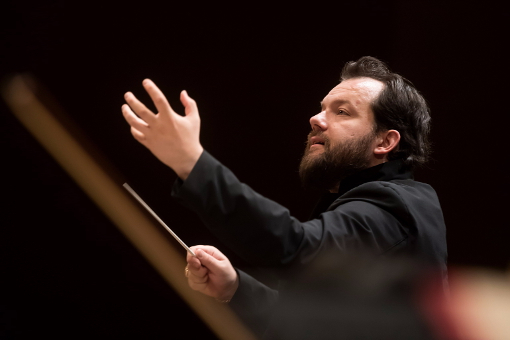Andris Nelsons celebrates his birthday with BSO in compelling Widmann premiere
The Boston Symphony Orchestra pulled out all the stops for music director Andris Nelsons’ birthday on Thursday night. Their concert at Symphony Hall featured his friend, Håkan Hardenberger, in the American premiere of a new trumpet concerto by Jörg Widmann; a performance of Gustav Mahler’s First Symphony; and a lusty, whole-house rendition of “Happy Birthday” by the orchestra and the audience.
Nelsons, 43, has long been a champion of Widmann’s. Given the theatricality and scope of the German composer’s latest piece, Towards Paradise (Labyrinth VI), it’s easy to understand why. The 40-minute, single-movement work — with a gleaming E-flat above the staff as its dramatic last note — certainly doesn’t hold much back. The solo writing is highly virtuosic in register, timbre and articulation.
Widmann’s concept of the score also involves spatial and lighting effects: The soloist begins and ends the work in the wings with the house lights dimmed, and in between performs from various positions on the stage. The music itself is strongly varied in tone — by turns melancholy, assertive, mischievous, and reflective.
These challenges held no terrors for Hardenberger. The trumpet virtuoso seemed perfectly at ease with Woodman’s labyrinthine demands, not least those of stamina. He imbued its long stretches of lyrical writing with supple warmth and its jagged allusions to jazz with an inviting degree of playfulness and energy.
Nelsons, who is so often an exemplary purveyor of new music, was likewise in his element, drawing kaleidoscopic sweep from an expanded BSO and from Woodman’s bracing orchestration, which include triple woodwinds, five percussionists, and an accordion.
Perhaps unsurprisingly, Towards Paradise’s gnarly climaxes built to quite a din. Yet the piece’s most striking moments are often delicate: a middle sequence featuring bell plates and bent notes; or, later, a meltingly beautiful lullaby for trumpet with pulsing harp accompaniment. Shortly before the end, there’s a hypnotic, faux-Wagnerian brass chorale. These introspective episodes and others like them came across with immediacy and subtlety.
Whether or not the piece exceeds the sum of its parts and achieves, as its title implies, transcendence, remains an open question. Thursday’s reading revealed some longueurs and the music’s multi-dimensional conceit didn’t prove as gripping as advertised. That said, Towards Paradise stands as one of the season’s most fascinating and original musical journeys. The audience sensed as much, rewarding Hardenberger with a fervent ovation.
They provided the same for Nelsons and the BSO after Mahler’s First, though here the interpretation was up and down. The beginning of the Ländler’s Trio was shapely and gemütlich. So was the Wunderhorn excerpt in the third movement. And the finale was genuinely thrilling, especially its radiant and triumphant second half.
But much of the larger performance felt mannered and lacked nuance. Tempos, especially in the first two movements, were often a hair slower than what’s needed for the music to freely breathe and dance. More frustrating, orchestral balances were off-kilter. Violins too often sounded scrawny when playing softly, particularly in the first movement, whose opening pages also wanted for sonic weight from the basses. In the third, the brasses tended to drown out the music’s foreground melodies.
Only the finale – bold, smartly directed, brimming with character – consistently fulfilled Leonard Bernstein’s maxim that a great performance is one in which the piece feels like it’s being written on the spot.
The program repeats Friday at 1:30 p.m. and Saturday at 8 p.m. at Symphony Hall. bso.org; 866-266-1200
Posted in Performances
